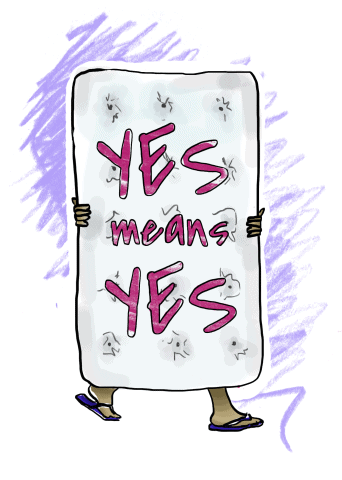FATUMA ADAR
 When it comes to tackling issues surrounding gender equality and zero-tolerance policies for sexual abuse, the college environment is undoubtedly the right place to start.
When it comes to tackling issues surrounding gender equality and zero-tolerance policies for sexual abuse, the college environment is undoubtedly the right place to start.
In recent months — and even more so in the last few weeks, we have taken incredible strides in these two areas.
The most recent news to put a smile on my face is the passing of California’s Affirmative Consent Law, more popularly known as “Yes Means Yes,” a law that protects students attending post-secondary institutions that take state financial funds.
The law takes a new approach to the idea that “no means no,” in terms of sexual consent, and does away with some ambiguity by asserting that a party must provide an affirmative response in order to consider the act consensual.
The reason why this is such a stride forward is because too often sex crimes go unpunished because of loopholes and the lack of a verbal refusal to engage. There are many reasons why someone can be kept from saying “no:” confusion, lucidity or even fear. “Yes Means Yes” entails that both parties can affirm their consent and make their choices clear.
The law isn’t perfect, of course, but it is a step in the right direction. There is the issue of what kind of body language can be constituted as consent, like a head nod or moving intimately closer to the other party. While a work in progress, it’s still something.
As I’ve mentioned, the bill applies to post-secondary institutions that take funding from the government, so it is something enforced — at the moment — strictly at public colleges and universities. But in all fairness, that is a great place to start.
The passing of this law reminded me of the story of Emma Sulkowicz from this September. Sulkowicz is a senior student at Columbia University who vowed to carry a mattress around campus as long as she still attended school with her alleged rapist. She displays a strong satirical symbol of the neglect that even the Ivy Leagues apply to these serious assault cases.
It’s important to understand the extent that a victim of a sexual crime has to go to in order to bring attention to their situation, as it is an incredible feat for victims to come forward to talk about their assault. If the university that you’re attending can’t take that seriously — or in even worse scenarios — tries to convince you that you’ve misunderstood the situation and invalidates your case, society itself will sink deeper into this victim-blaming culture.
Dismissing people as becoming over-sensitized and society being once again “muzzled” by political correctness is an easy trap to fall into. But when it comes to someone being able to enforce their rights over their own body, there is no excuse for anyone to cut corners. And if we aren’t able to set a standard of mutual respect in a learning environment, how will that trickle out into culture?
Laws like “Yes Means Yes” start a positive discussion and I hope that it becomes something that spreads to other universities. A safe study environment is key for any student’s success — something that should be a primary concern for a university. This includes mental and physical safety, and crimes against these basic human rights should be addressed and not swept under the rug.
In the meantime, if anyone finds themselves in a situation where someone doesn’t undertand either that “no means no” or the reinvented “yes means yes,” I encourage you to speak to someone and not refrain from allowing your voice to be heard. Like Sulkowicz, if you feel like you have to say something that should be said, then say it. Being able to do so not only gives you an opportunity to address the situation, but also gives others the courage to do the same.
Closing with words that have been buzzing around campus for days, consent is beautiful.
—
Graphic: Stephanie Mah/Graphics Editor
Leave a Reply